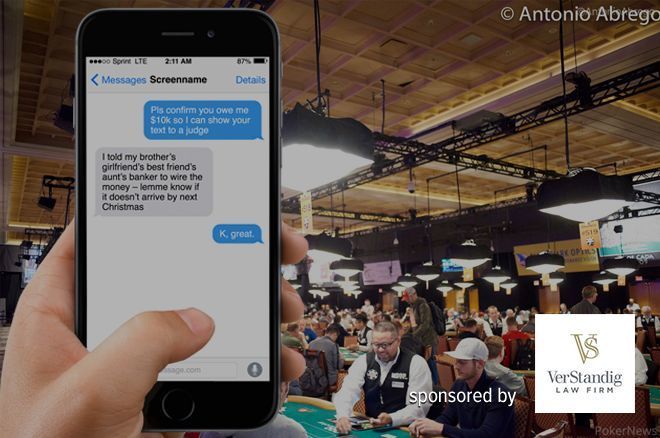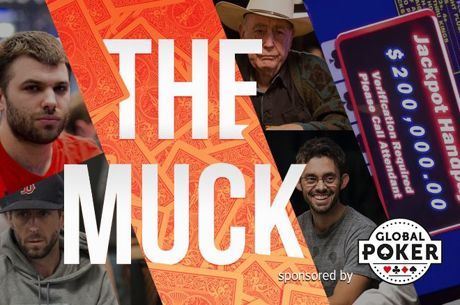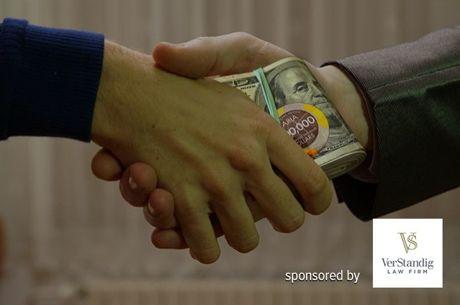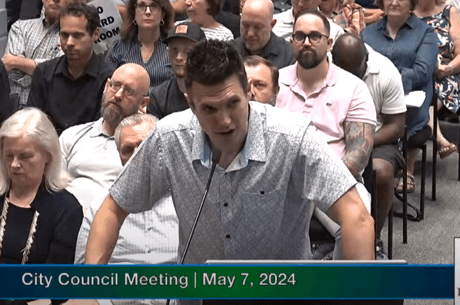WSOP Insights: Collecting on Tricky Debts

Maurice ��Mac�� VerStandig is the managing partner of the VerStandig Law Firm, LLC, and focuses his practice on representing poker players, advantage gamblers, and other industry professionals in all manner of legal situations. He can be reached at 301-444-4600, or [email protected].
That the early days of this World Series of Poker saw vibrant online chatter concerning allegedly unpaid debts should come as no genuine surprise. While it is universally unnerving to see a colleague��s name and face put to the western hustler stereotype �C truthfully, slanderously, or otherwise �C one need not loiter too long in a Vegas card room to absorb colorful stories of angles shot well away from the tables.
one need not loiter too long in a Vegas card room to absorb colorful stories of angles shot well away from the tables.
So while I have hopefully offered some meaningful guidance on how to structure debts and staking arrangements in my first two columns of the summer, please permit this slight detour into the options available when someone is too brash, timid, na?ve, or otherwise proud to heed such guidance.
Consider a purely hypothetical scenario involving a lender who we shall call ��Lender,�� a backer who we shall deem ��Backer,�� and a debtor/player with an alias to be known as ��Nickname.��
In this fictitious construct, Nickname has borrowed $10,000 from Lender to finance his bankroll, and entered into a backing agreement with Backer to allow him entry into a diverse array of tournaments.
Nickname has elected to dishonor his debt to Lender, and to avoid tendering tournament proceeds to Backer.
Assume, too, that despite eventual success on the felt, Nickname has elected to dishonor his debt to Lender, and to avoid tendering tournament proceeds to Backer; none of the at-issue agreements are properly in writing; and nary a soul is entirely certain what other creditors may lurk in the tent village of poker sleepaway camp.
While Lender and Backer would no doubt be on safer footing, better served, and more reasonably confident of recourse if they had heeded my advice (ahem), they may still find a beacon of hope atop a local courthouse. But before pleading their cause to a robed arbiter, there will be some key points of consideration:
Make sure gaming debts are enforceable in the state where suit is being brought
The transient nature of grinders tends to give people a healthy array of options in electing where to file suit �C the state where Nickname resides, the state where Nickname borrowed from Lender, any state in which Nickname played a tournament with Backer��s money, any state where Nickname is regularly dealt cards �C and it is imperative to ensure the right state is selected or a resulting case may be drawing dead from the date it is filed.Gather as much evidence as possible
Did Nickname tell anyone that he is staked by Backer or working a debt to Lender? If so, get their accounts in writing �C a defendant��s own admission is often a permissive exception to hearsay rules, and anything Lender or Backer can do to transform a ��he said / she said�� case into one of ��man versus testifying mob�� will go a long way.Secure some acknowledgment of the debt
Communicate with Nickname over text or e-mail, and endeavor to secure some acknowledgment of the debt. ��Pls confirm you owe me $10k so I can show your text to a judge�� may not elicit the desired response, but a more gentle ��By my math, you still owe me $10k �C any hope of collecting before summer is out?�� may yield a reply. Even an indifferent response �C ��Find me after the Milly Maker�� �C can be beneficial in evidencing the debt is not genuinely disputed; any more animated avoidance (��I told my brother��s girlfriend��s best friend��s aunt��s banker to wire the money �C lemme know if it doesn��t arrive by next Christmas��) will not only give a passive acknowledgement but may serve to garner the sympathies of a cynical judge.Find out Nickname��s real name, and use it when filing suit.
A judgment against ��Tommy the Plumber�� is going to be hard to collect upon. And courtesy of myriad poker live blogs and tournament result archives, finding someone��s given name is not as difficult as in the days of yore.Be reasonable in what you seek
If Nickname owes $25k on a backing arrangement, sue for $25k �C not a penny more. People have a feverish addiction to seeking all manner of interest, asking the court to compensate them for their time, and petitioning for brash multipliers on the mistaken theory that it is best to aim high and settle low. Judicial proceedings are not poker games �C your ethos matters a great deal, and C-betting with air will not garner GTO admiration so much as disdainful scorn.Consider carefully which court in a given state to use
Many �C but not all �C locales have a multi-tiered judicial system, where lower value cases are handled in more informal settings. The degree of informality, and the dollar cutoff, vary wildly from state to state. But if Nickname owes $31k, and the lower-tier court has a cutoff of $30k, it may well be worthwhile to write off $1k and enjoy more relaxed procedures in lieu of a scheduling order commanding the detailed nomination of expert witnesses, rigid mandates for the advanced designation of trial exhibits, unforgiving adherence to evidentiary rules, and a seemingly never-ending montage of pre-trial hearings.See if others are similarly situated
Once you file suit, put word on the street and see if others are similarly situated. No, a class action is not in the cards. But if Nickname owes enough people money, there may be some pragmatic benefits to working as a group �C including a somewhat complex maneuver involving putting Nickname into an involuntary bankruptcy.Domesticate it in any state where Nickname is known to play cards
If you secure a judgment, domesticate it in any state where Nickname is known to play cards. Finding assets to levy on in satisfaction of a judgment can be mind-numbing, but card room safe deposit boxes �C and even tournament proceeds �C are attachable with a well-timed and properly executed garnishment.Hire a lawyer
Having counsel conveys the seriousness of a claim to the court, relieves you of the burden associated with navigating the oft-perplexing ins and outs of judicial procedure, and gives you an advocate who has played this game before. Will I shamelessly plug that my firm handles this sort of work for poker players on a habitual basis, that we often work on a contingency so we only get paid if you get paid, and that my bag of tricks extends well beyond the generic contours of this column? Of course. But even if you want nothing to do with me or my firm, there are plenty of capable attorneys out there.
In this Series
- 1 WSOP Insights: Restoring Honor Amongst Thieves
- 2 WSOP Insights: Legal Guide to Poker Staking
- 3 WSOP Insights: Collecting on Tricky Debts
- 4 WSOP Insights: Six Things (Not) To Do When You Get Arrested
- 5 WSOP Insights: America��s Sports Betting Line Has Moved
- 6 WSOP Insights: Why Razz Was an Integral Part of My Legal Education








